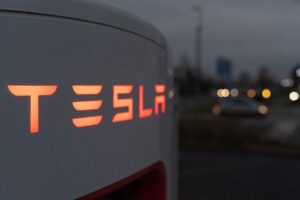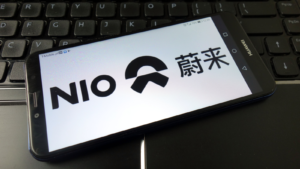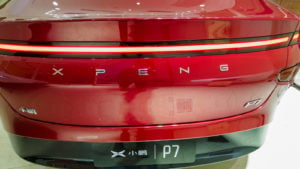3 EV Stocks to Avoid Like a Dead Battery After Xiaomi’s SU7 Triumph
Xiaomi (OTCMKTS:XIACY), known for its smartphones, is making a bold entry into the electric vehicle (EV) market. The company announced it will launch its first EV at competitive prices, which put several names in the EV stocks to avoid category following the highly successful SU7 launch.
Xiaomi co-founder Lei Jun unveiled the SU7 range, with the base model priced at approximately $30.000. The company set ambitious sales targets, with pre-orders for the SU7 surpassing 50,000 within minutes of the announcement, reflecting strong consumer interest.
Xiaomi’s EV venture, backed by a $10 billion investment, seeks to challenge industry leaders by offering high-spec vehicles at attractive prices. The SU7 models, designed to rival Tesla’s (NASDAQ:TSLA) Model 3 and the electric Porsche Taycan, is the latest strategic move in the global EV market. Tesla and BYD (OTCMKTS:BYDDY) currently dominate that space.
Goldman Sachs (NYSE:GS) analysts said in its report that they see the fully electric sedan as a “highly competitive” product, which “demonstrates Xiaomi’s capabilities of becoming a potential price leader in the market rather than a price follower.”
Fitch Ratings has projected a slowdown in the growth of EV sales in China, forecasting a 20% increase for 2024 compared to the 37% growth experienced in 2023. The deceleration is attributed to economic uncertainties and the rising levels of competition within the sector.
As such, here are three EV stocks to avoid.
Tesla (TSLA)

Tesla is arguably the world’s most prominent EV manufacturer. Headed up by billionaire Elon Musk, Tesla has led the EV revolution for more than a decade. However, the company’s stock has struggled in recent months, with analysts highlighting Tesla’s struggle to come out with a cheap EV product.
There is a demand issue stemming from Tesla’s limited and high-cost product lineup, primarily the Model 3 and Model Y, suggesting market saturation and intensifying competition within the EV sector. That competition necessitates price cuts, adversely affecting profit margins. Amid these challenges for the last six months, Tesla has been the only S&P 500 stock with a double-digit loss, underscoring the unique pressures it faces compared to the broader market.
Without new high-volume offerings until 2026, and with the Cybertruck targeting a limited market, Tesla has been facing gross margin pressures, impacting stock performance.
Along these lines, Tesla is one of the EV stocks to avoid in 2024, especially after Reuters reported the company is scrapping low-cost car plans. The news sent shares tumbling, with investors unable to identify a catalyst to help shares re-rate in the near term.
Nio (NIO)

Nio (NYSE:NIO) is one of the companies likely to be greatly impacted by Xiaomi’s EV market entry. That is evident in the lackluster share price performance in recent months.
Barclays analysts recently downgraded the stock’s rating to Underweight from Equal Weight, while also decreasing its price target from $5 to $4 per share. The downgrade reflects concerns over Nio’s sales performance, particularly with its 2024 model lineup, which debuted in March. It did not meet sales expectations.
Barclays pointed out that March’s weaker sales underscore challenges in meeting the company’s forecast for the year, citing the first quarter deliveries aligned with the revised guidance of 30,000 units but fell short of the initial projection of 31,000 to 33,000 units.
Analysts also said that Xiaomi’s first car is a “highly competitive EV sedan.” With a limited number of new product launches anticipated for the remainder of 2024, Barclays anticipates significant risks to Nio’s capacity to fulfill consensus estimates for the year.
Xpeng (XPEV)

Similar to Nio, Xpeng (NYSE:XPEV), one of the three EV stocks to avoid, is an up-and-coming China EV company that aims to disturb Tesla and BYD’s leadership positions. However, the company’s plans have been negatively impacted by the successful launch of Xiaomi’s SU7.
Compared to July 2023, Xpeng stock trades 65% lower due to several factors, including the SU7 launch, weak global demand for EVs and aggressive price cuts initiated by Tesla.
Xpeng stock sentiment was further dampened after Citi (NYSE:C) analysts said they believe the EV maker will be mostly impacted by the arrival of SU7. The vehicle’s significant space relative to its price distinguishes it from rivals such as the Luxeed S7, Zeekr 001, Xpeng P7i and Han EV.
The competitive edge, they suggested, will likely drive a consistent rise in the SU7’s production and sales in the first three to four months following its market introduction. Analysts highlighted that Xiaomi and Xpeng have “strong ASP overlapping.”
Xiaomi has produced inventory in advance, and analysts believe the company could ship 5,000 to 6,000 vehicles in April, with full-year sales/production at around 55k to 70k units. As such, Citi kept its Sell rating on Xpeng’s stock.
On the date of publication, Shane Neagle did not hold (either directly or indirectly) any positions in the securities mentioned in this article. The opinions expressed in this article are those of the writer, subject to the InvestorPlace.com Publishing Guidelines.

